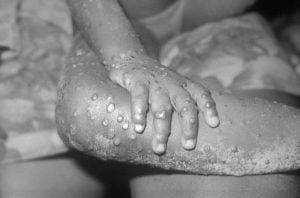
OPD schedule during Ramadan (9 am – 4 pm)
- Hotline: 10654
- Emergency: +880 1958-509 222
- info@shiphospitalbd.com
Monkeypox is a viral disease caused by the monkeypox virus, primarily found in Central and West Africa but has recently spread to other regions. It can be transmitted through contact with infected animals or from person to person via respiratory droplets and direct contact with bodily fluids or lesions.

Severity and Complications:
Usually mild but can be severe in young children, pregnant women, or immunocompromised individuals. Complications include secondary infections, respiratory issues, sepsis, encephalitis, and potential vision loss.
Diagnosis:
Treatment:
No specific treatment; supportive care is key. In some cases, antivirals like Tecovirimat may be used.
Prevention:
Recent Outbreaks:
Monkeypox gained global attention during outbreaks in Europe and North America in 2022, highlighting the need for robust public health measures.